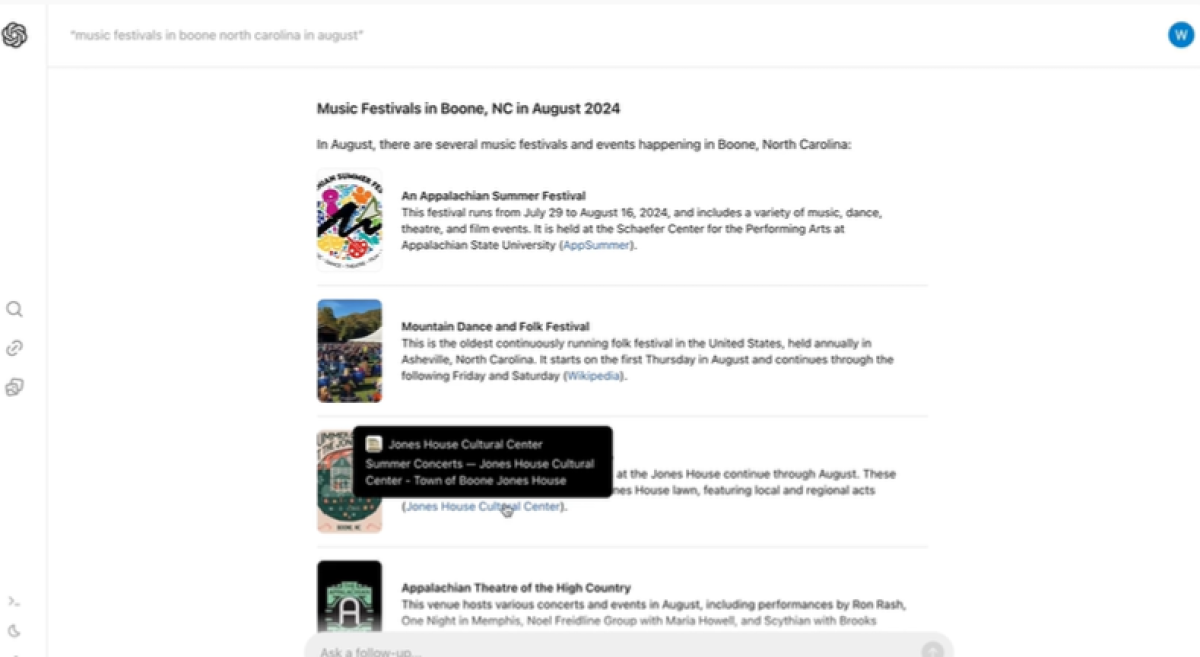OpenAI is piloting an AI-powered search engine, a long-expected service that uses artificial intelligence to summarize information on the internet, with citations, in similar ways to Google‘s current search engine — making it a direct threat to Google’s core business.
SearchGPT, as the service is called, is meant to ” combine the strength of our AI models with information from the web to give you fast and timely answers with clear and relevant sources.”
“Getting answers on the web can take a lot of effort, often requiring multiple attempts to get relevant results,” the company stated in its release. “We believe that by enhancing the conversational capabilities of our models with real-time information from the web, finding what you’re looking for can be faster and easier.”
We’re testing SearchGPT, a temporary prototype of new AI search features that give you fast and timely answers with clear and relevant sources.
We’re launching with a small group of users for feedback and plan to integrate the experience into ChatGPT. https://t.co/dRRnxXVlGh pic.twitter.com/iQpADXmllH
— OpenAI (@OpenAI) July 25, 2024
The San Francisco-based company released a video that showed the product being used to search for music festivals in Boone, North Carolina during August. SearchGPT was able to produce several results with descriptions as well as links to their sources.
Rather then searching for new results, SearchGPT allows for a user to “ask follow-up questions, like you would in a conversation with a person, with the shared context building with each query, similar to ChatGPT’s ability to refine its answers.
The program is also mean to address concerns from publishers that the large-language models (LLMs) that power today’s AI bots are plagiarizing their content and hurting traffic. The results page on SearchGPT features relatively prominent links to the sources it cites.
“For decades, search has been a foundational way for publishers and creators to reach users,” the press release states. “Now, we’re using AI to enhance this experience by highlighting high quality content in a conversational interface with multiple opportunities for users to engage.”
Altman took to X to share how “pleasantly surprised” he “is with the SearchGPT functions.
i have been pleasantly surprised by how much i prefer this to old-school search, and how quickly i adapted.
join the waitlist here: https://t.co/sz5MNcEp1H
please let us know what you think!
— Sam Altman (@sama) July 25, 2024
“We think there is room to make search much better than it is today,” Altman wrote. “We will learn from the prototype, make it better, and then integrate the tech into ChatGPT to make it real-time and maximally helpful.”
Google recently integrated AI-generated summaries that often appear at the top of search results. The rollout of the feature was hasty and riddled with errors and false information, though Google says it has made fixes since.
OpenAI’s business partner, Microsoft, is also testing AI summaries for Bing searches.
OPenAI said it has already partnered with large media publishers on SearchGPT and was soliciting feedback.
“AI search is going to become one of the key ways that people navigate the internet, and it’s crucial, in these early days, that the technology is built in a way that values, respects, and protects journalism and publishers. We look forward to partnering with OpenAI in the process, and creating a new way for readers to discover The Atlantic,” said Nicholas Thompson, the CEO of The Atlantic, in the press release.
With the launch of the SearchGPT prototype, OpenAI is also testing a way for publishers to manage how they appear in the program.

“Sam and the truly talented team at OpenAI innately understand that for AI-powered search to be effective, it must be founded on the highest-quality, most reliable information furnished by trusted sources,” Robert Thomson, the chief executive of Fox parent News Corp, said in the press release. “For the heavens to be in equilibrium, the relationship between technology and content must be symbiotic and provenance must be protected.”
While the prototype is currently temporary, OpenAI said they plan to launch the search ferature directly into ChatGPT in the future.
Do you have a story we should be covering? Do you have any questions about Sam Altman and OpenAI? Contact LiveNews@newsweek.com.
Uncommon Knowledge
Newsweek is committed to challenging conventional wisdom and finding connections in the search for common ground.
Newsweek is committed to challenging conventional wisdom and finding connections in the search for common ground.







